A Short History of Partizans
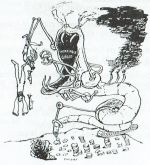
artwork characterising the mining money machine
Partizans (People Against Rio Tinto Zinc and Subsidiaries) was a campaigning organisation set up to support land based peoples in their concerns about the mining operations of RTZ (now Rio Tinto). Partizans was most active in the 1980s, attending company AGMs and producing a newsletter, Parting Company. This brief history is intended to act as an introduction to the online archive
Beginnings
 cover thumb.jpg)
The book by Jan Roberts which raised concerns in Australia
During the 1970s some people in the peace movement, campaigning about nuclear weapons were concerned about uranium mining. Roger Moody was editor of Peace News and living above the shop and together with a few other people he set up Colonialism and Indigenous Minorities Research and Action (CIMRA). One of those involved, Jan Roberts, had written a book From Massacres to Mining about mining in Australia.
In 1978 CIMRA invited an Aboriginal delegation to tour Europe; after an abortive interview with the company the delegates asked that an organisation be set up to monitor Rio Tinto Zinc (RTZ) as it was then known - and Partizans was born!
Indigenous delegations
People Against Rio Tinto Zinc and Subsidiaries (PARTiZANS) campaigned about environment, land rights and related matters as highlighted by indigenous/land based peoples. Rio Tinto is a large London based mining company with operations in many countries.
Partizans' main focus of activities was the Annual General Meeting (AGM) of RTZ held in London in April each year. Partizans tried to get representatives of affected peoples to visit London and put their concerns to the directors in the public forum of the company AGM. Partizans produced a newsletter, Parting Company, surviving copies of which can be found in this archive.
In 1981 CIMRA (Colonisation and Indigenous Minorities Research and Action) together with Survival International organised a Tribunal with films and workshops with speakers from Aboriginal Australia, Panama, Namibia, Canada and Bolivia.
Disinvestment
Many local councils and charities or their pension funds had investments in RTZ shares.
Many organisations had anti-racism or anti-nuclear policies at the time and Partizans and others built on these to promote disinvestment from companies like RTZ, whose activities were not in line with these policies. The Case for Disinvestment 1981 laid out the reasons.
The political context of the time (late 1970 through to early 1990s) was that of Thatcher (in UK) and Reagan (in the USA). The fight against apartheid in South Africa was a major concern as were nuclear weapons in Europe but there was only limited awareness of global warming (what we now know as climate change). Shareholder campaigns were not new - WDM (World Development Movement, now Global Justice Now) had been running one about tea workers' conditions for several years. Disinvestment campaigns has been run around companies operating in apartheid South Africa.
Attending AGMs
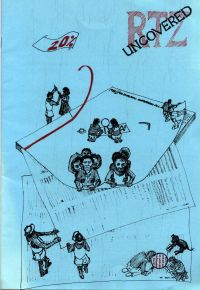
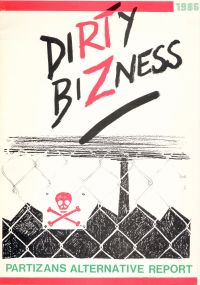
Two alternative reports were funded by the GLC in the 1980s
In the early 1980s around 40 "dissident" shareholders attended the RTZ AGMs, along with several hundred regular shareholders, investors and journalists. Partizans saw the AGM as the only opportunity to hold the company publicly accountable for its misdeeds. Partizans did try to work with media organisations to get coverage but it was not a strength.
As part of attending the AGM Partizans produced several 'Alternative Annual Reports' in different styles. Sadly not all of these have survived in the archive. In 1981 in Cause for Concern we highlighted issues in Canada, Panama, Australia and Southern Africa.
At the 1982 RTZ AGM the chair tried to close the meeting before all shareholders had a chance to ask questions, which led to uproar and the police being called as Aboriginal representatives stormed the platform asking to be heard. This led to the company being more careful in managing AGMs in subsequent years; they got better PR even as their negative impact on people continued.
Parting Company
Partizans produced an irregular newsletter called Parting Company which highlighted many of the opposition to RTZ operatioins including in Australia, South Africa, PNG, Britain and USA. Also included campaign news and events.
Anti-apartheid and anti-nuclear
At the time, South Africa was still governed under apartheid and had occupied South West Africa (now Namibia). RTZ had the Rossing uranium mine in Namibia and the United Nations had declared that exports of Namibia's natural resources was illegal. There was an active group called Campaign Against the Namibian Uranium Contracts (CANCU) who brought many supporters to question the company at AGMs (sometimes overshadowing other issues).
After Namibia gained independence in 1990, the new SWAPO government wanted the mine to continue, much to the dismay of some anti-nuclear activists and the campaign then became one about health of workers at the mine. Partizans contributed to the book Past Exposure exposing some of the company lies.
Leveraging the councils anti-nuclear policies, Partizans got a grant from the Greater London Council (GLC) to produce 2 alternative reports; in 1985 RTZ Uncovered highlighted issues from Weipa in Australia, Namibia and South Africa. The second GLC funded report RTZ Dirty Bizness in 1986 raised concerns closer to home in Avonmouth (Bristol), Anglesey Aluminium and Cornwall, where RTZ had reopened a tin mine; here Partizans collaborated with the independent Labour Research Department. Radioactivity from the Canadian Rio Algom uranium mine was also a concern.
The GLC pension fund had shares in RTZ which Partizans among others was urging them to disinvest themselves of. The Labour run GLC was abolished by Thatcher's Conservative government in 1986. On the last day the GLC held a fair on the south bank where Partizans had a stall, promoting its report Where there's Brass. The GLC did sell its shares just before it was abolished.
Organisation and Cooperation
Partizans was run from a semi-derelict house ("short life" housing association property) in Islington, north London for most of its existence, where various people lived. Here meetings were held, the newsletter written and produced. It was mostly chaotic and dirty, never an easy place to work, with every surface covered in papers. Typically, information was badly photocopied, with date missing and then the original lost!
That is reflected in some of the fragments which ended up in the archive. There was a wealth of creativity in campaigning and in the production of visual material, some of which is in the archive, though sadly a lot has been lost. During the 1980s monthly meetings were held to organise people visiting for the AGM, discussing fundraising and producing the newsletter.
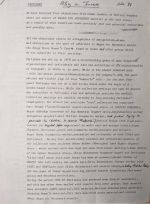
This "policy on inserts" is actually a discursive look at Partizans operations
Partizans existed in the diverse pool of leftist activists, with the usual factionalism. Partizans was inadvertently drawn into these on occasions. Having circulated material from the Wages for Housework campaign, we got come complaints and responded with Policy on Inserts. There were also, sadly, difficulties on a personal level, sometimes sparking furious resignation letters.
Partizans also had many productive relationships with other organisations. In the UK these included Down To Earth (campaigning on resources in Indonesia), Survival International (indigenous people support organisation), Tapol (Indonesia human rights organisation), Namibia Support Group, WDM (now Global Justice Now), War on Want, 3W1 (Third World First, a student campaign, now People and Planet) amongst others. Internationally Partizans worked with many indigenious organisations and others supporting them.
Funding
Partizans was mostly was funded by individual supporters. It was a constant struggle; we even tried selling books to raise funds. For overseas visitors to AGMs trusts for approached and the Methodists, Onaway Trust, Oxfam and others gave grants.
Remarkably Partizans obtained funding from the GLC (Greater London Council) to produce alternative reports in 1985 and 1986.
Use of technology
Like all campaigns of the 1970s and 80s manual typewriters, pasting the copy together and photocopying were the bed rock of Partizans production of it's newsletter, Parting Company. Keeping a working photocopier was an expensive proposition and caused much angst at meetings. An (satirical) article in Parting Company called for the setting up of PACC (People against Cannon Copiers). There was a certain resistance to use of computers, although in 1987 using a basic email service Partizans organized a visit from two Aboriginal representatives from the Western Desert Land Council to oppose the proposed Rudal River uranium mine.
Plunder!
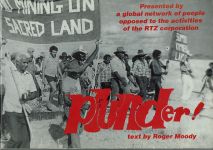
Plunder! book published in 1991 covered concerns over the previous 10 years
To mark 10 years of Partizans it was proposed to produce a book about our work. This was eventually published in 1991 as Plunder!
After 10 years a campaign checklist (undated but probably around 1989 as it contained a 01 telephone number) included short, medium and long term aims which were to be implemented by different tactics, including alliances and disinvestment.
Creative Campaigning
During the 1980s a small group (the London Collective ) met monthly to discuss current issues, strategy, fundraising, the AGM and (inevitably) the photocopier! Invitations to these collective meetings were sometimes amusingly framed as coming from the RTZ company secretary or the chairman.
Beyond Partizans
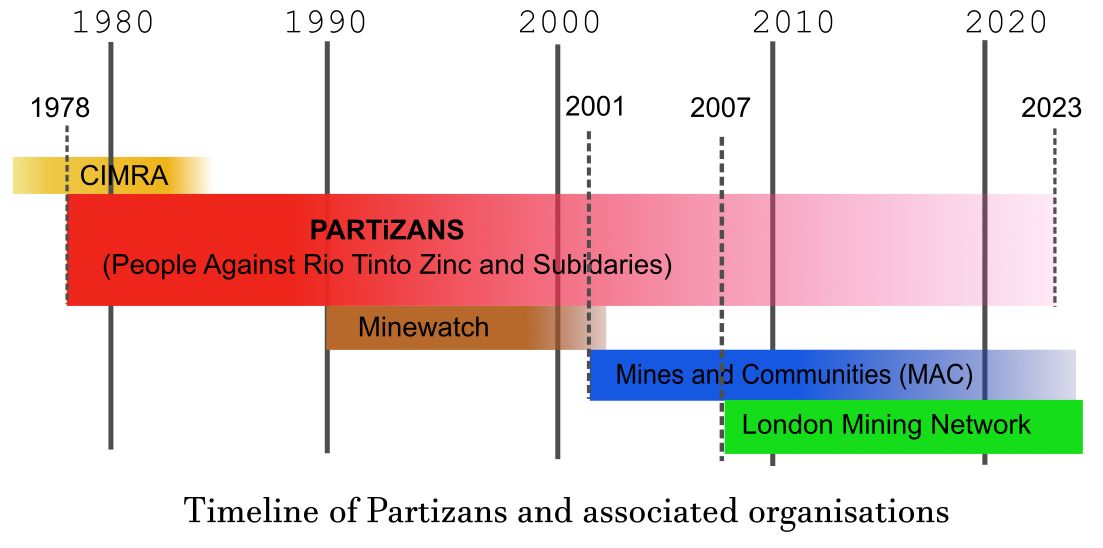
Minewatch
 1992 cover thumb.jpg)
A giant compendium of opposition to mining destruction
Towards the end of the 1980s Partizans was being contacted by people concerned about the impact of other mining companies. It was this which led to the setting up of Minewatch around 1990. In 1992 The Gulliver File book by Roger Moody was published, a giant compendium of the history of many mining companies, including Rio Tinto and it's many subsidiaries. Minewatch was partly conceived as an 'update service' for the Gulliver book. Minewatch's brief was to disseminate information to and from groups around the world. This was done with quarterly mailings of photocopied press reports and campaign materials. Minewatch operated out of the same chaotic office which Partizans used in Islington. With people's energies devoted to Minewatch, Partizans activity declined although questions were still asked at the RTZ AGM.
Mines and Communities
In 2001 with no let up in the concern over the social and environmental impacts of mining but now with the potential of the internet to distribute information, some people involved in Partizans set up the Mines and Communities (MAC) website, after a conference in London, which adopted 'The London Declaration 2001'. MAC had an 'editorial board' which approved articles via an email list to go on the website. The volume of potential information and lack of editorialising meant this quickly became overwhelming.
Mines and Communities had some success at fundraising for various research projects but a failure to deliver meant the organisation declined, lacking effective governance, although continuing to post press articles to the website.
Mines and Communities is now an archive site containing 14,000 articles referenced by company, mineral and country with Rio Tinto still the top referenced company, showing the importance of Partizans work.
London Mining Network
The London Mining Network was conceived as a campaigning organisation to address the concerns of indigenous communities affected by London based mining companies. LMN has continued Partizans work in bring representatives to London mining company AGMs to ask questions, seek assurances and get support with and publicise their concerns. To avoid some of the problems seen with MAC and Minewatch, it was set up with a broader governance structure and is now a registered charity with funding and several part time workers.
Endings
With the death of Roger Moody in 2022 Partizans was finally wound up as an organisation in 2023. A few hundred pounds of remaining funds was transferred to MAC to fund their website. Four box files of paper archives were given to the Bishopsgate Institute. The work of holding mining companies, including Rio Tinto, to account at AGMs continues through the London Mining Network.
Written by Paul Thomas, February 2023

